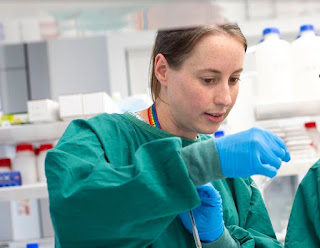 |
| Dr Bridgette Semple in the lab. See more about her research |
Following a moderate to severe traumatic brain injury, approximately 30% of patients will develop epilepsy (post-traumatic epilepsy). Dr Semple said, "We are currently unable to accurately predict the risk of post-traumatic epilepsy for an individual patient, and there are no effective drug treatments to prevent epilepsy after a brain injury."
Patients who experience a severe traumatic brain injury are particularly susceptible to hospital-acquired infections, including septicemia, pneumonia and urinary tract infections. As infections are known risk factors for seizures and the development of epilepsy, Dr Semple’s research program will address the potential link between infections and epilepsy in the context of brain injury.
The three year translational research project being led by Dr Semple will investigate how hospital-acquired infections may be associated with poorer patient outcomes following a traumatic brain injury, and establish a preclinical animal model to study if these infections contribute to the development of post-traumatic epilepsy.
Dr Semple said, "We're really pleased to have received the funding to conduct this research. Our findings will guide how to best manage brain-injured patients in the future." Twenty two applications were received for the FY19 ERP Idea Development Award, of which Dr Semple was among only one of five applications recommended for funding.
The research will be conducted in a collaboration with Professor Jian Li (Head, Laboratory of Antimicrobial Systems Pharmacology, Monash Biomedicine Discovery Institute), and Professor Terence O’Brien (Head, Central Clinical School and Epilepsy and Neuropharmacology Research Group).

No comments:
Post a Comment
Thankyou for your comment. We moderate all messages and may take a little time to review your comment. Please email inquiries to ccs.comms@monash.edu.